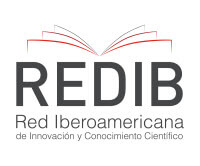Analysis of the environmental strategies implemented by the ecouniversities of Antioquia and their influence on the mitigation of the carbon footprint
DOI:
https://doi.org/10.33131/24222208.387Keywords:
Environmental strategies, carbon footprint, sustainability, environmental impact, Sustainable DevelopmentAbstract
The focus of this study is particularly relevant in the current context, where awareness of environmental sustainability has gained greater importance. The initiative of the Ecouniversities in Antioquia, recognized by Corantioquia, highlights the active role that the educational sector can and should play in promoting sustainable practices. The methodology adopted in the study, which combines qualitative and quantitative analysis without manipulating the variables and with a transversal approach, allows a broad and detailed understanding of the strategies implemented. This study not only highlights the importance of adopting measures to reduce the carbon footprint within educational institutions, but also shows how universities in Medellín are leading by example, implementing strategies that go beyond legal requirements to contribute significantly. to environmental sustainability. By analyzing the practices of these Ecouniversities, the work offers valuable lessons on how institutions can integrate sustainability into their operational and academic core. The relevance of this analysis lies in its ability to provide tools and references for other institutions seeking to undertake or improve their sustainability initiatives. The identified strategies not only benefit the environment, reducing the negative impact of human activities, but also foster a culture of environmental responsibility and commitment within the academic community and beyond. In conclusion, this work offers a significant contribution to the field of environmental sustainability in the educational context, highlighting how universities in Medellín and Antioquia are adopting a leadership role in carbon footprint mitigation. This proactive approach to sustainability is a model to follow for institutions in Colombia and around the world.
Downloads
References
F. Chavarría, Ó. M. Molina, R. Gamboa, y J. Rodríguez, «Medición de la huella de carbono de la Universidad Nacional de Costa Rica para el periodo 2012-2014. Rumbo a la carbono neutralidad», Uniciencia, vol. 30, n.o 2, pp. 47-62, jul. 2016, doi: https://doi.org/10.15359/RU.30-2.4 .
P. Ortiz-Grisales, J. Patiño-Murillo, y E. Duque-Grisales, «Comparative Study of Computational Models for Reducing Air Pollution through the Generation of Negative Ions», Sustainability, vol. 13, n.o 13, p. 7197, jun. 2021, doi: https://doi.org/10.3390/su13137197 .
J. C. Lopera Lopera, L. F. Avalos Hincapié, y E. A. Duque Grisales, «Alternativa de financiación basada en titularización para la producción de plátano en el Urabá antioqueño», Rev. Cintex, vol. 24, n.o 1, pp. 41-50, dic. 2019, doi: https://doi.org/10.33131/24222208.343 .
E. Carvajal, C. Chalarca, R. A. Arbelaez Perez, y E. Duque Grisales, «Responsabilidad Social de las entidades financieras colombianas en tiempos de covid-19», Rev. Cintex, vol. 25, n.o 2, pp. 51-66, dic. 2020, doi: https://doi.org/10.33131/24222208.364 .
E. A. Duque Grisales, D. Castañeda, J. A. Patiño Murillo, C. Pino Zapata, y H. Moná Martínez, «Measuring competitiveness of agri-food chains in Antioquia through productivity indices», Technology Reports of Kansai University, vol. 63, n.o 03, pp. 7377-7390, mar. 2021.
M. A. Muñoz Nieto, D. R. Rojas Blair, C. C. Córdoba Vanegas, y J. A. Patiño Murillo, «Análisis comparativo del índice de Libertad económica de 2019 entre Colombia y otros países de Suramérica», Revista CINTEX, vol. 25, n.o 1, pp. 68-83, 2020, doi: https://doi.org/10.33131/24222208.360 .
S. Sinforoso y E. Álvarez, «La Facultad De Contaduría Tuxpan De La Universidad Veracruzana Ante Los Desafíos Del Desarrollo Sostenible», Hitos de Ciencias económico Administrativas, vol. 26, n.o 74, pp. 33-45, 2019, doi: 10.19136/hitos.a26n74.3693.
H. Schneider y J. Samaniego, «La huella del carbono en la producción, distribución y consumo de bienes y servicios», 2010. [En línea]. Disponible en: https://repositorio.cepal.org/bitstream/handle/11362/3753/S2009834_es.pdf
R. Hernández Sampieri y C. P. Mendoza Torres, Metodología de la investigación: las rutas cuantitativa, cualitativa y mixta, First edition. México: McGraw-Hill Education, 2018.
Departamento Nacional de Planeación, PLAN NACIONAL DE DESARROLLO 2018 - 2022: «Pacto por Colombia, pacto, por la equidad», Departamento Nacional de Planeación. Bogotá D.C.: Departamento Nacional de Planeación, 2019. [En línea]. Disponible en: https://colaboracion.dnp.gov.co/CDT/Prensa/PND-Pacto-por-Colombia-pacto-por-la-equidad-2018-2022.pdf
«El Plan de Desarrollo UNIDOS POR LA VIDA 2020-2023: un ejercicio de descentralización de gobierno para la equidad». Accedido: 23 de julio de 2023. [En línea]. Disponible en: https://antioquia.gov.co/prensa/hist%C3%B3rico-de-prensa-2/8816-el-plan-de-desarrollo-unidos-por-la-vida-20202023-un-ejercicio-de-descentralizacion-de-gobierno-para-la-equidad
P. Zarta Ávila, «La sustentabilidad o sostenibilidad: un concepto poderoso para la humanidad», Tabula Rasa, vol. 28, pp. 409-423, 2018.
D. Morales Céspedes y E. A. Duque Grisales, «Aplicación del criterio de mínimo costo en la determinación del óptimo tamaño de planta para una empresa cafetera en Antioquia», Rev. Cintex, vol. 24, n.o 2, pp. 55-63, dic. 2019, doi: https://doi.org/10.33131/24222208.347 .
Y. S. Rentería, «Estrategias de educación ambiental de institutos descentralizados en el sistema educativo colombiano en Medellín», Revista Facultad Nacional de Salud Pública, vol. 26, n.o 1, pp. 78-89, ene. 2008.
L. I. Litzner y W. Rieb, «La Educación para el Desarrollo Sostenible en la universidad boliviana. Percepciones del profesorado», Teoría de la Educación. Revista Interuniversitaria, vol. 31, n.o 1, Art. n.o 1, abr. 2019, doi: https://doi.org/10.14201/teri.19037 .
E. A. Duque Grisales, «El consumidor ético como agente clave para un mundo sostenible», Rev. Cintex, vol. 26, n.o 1, pp. 10-11, jul. 2021, doi: https://doi.org/10.33131/24222208.391 .
A. Fernández, «Educación para la sostenibilidad: Un nuevo reto para el actual modelo universitário», Research, Society and Development, vol. 7, n.o 4, pp. 01-19, 2018.
D. S. Reyes y L. T. Panche, «Determinación de la huella de carbono de la Universidad de La Salle sede Candelaria», Tesis de pregrado, Universidad de la Salle, 2019. [En línea]. Disponible en: https://ciencia.lasalle.edu.co/cgi/viewcontent.cgi?article=2131&context=ing_ambiental_sanitaria
M. Puchades Gallart, A. De La Guardia Anaya, y M. Albertos Puebla, «La huella de carbono de la Universitat de València», Cuadernos de Geografía de la Universitat de València, pp. 99-113, 2012.
F. Chavarría, Ó. M. Molina, R. Gamboa, y J. Rodríguez, «Medición de la huella de carbono de la Universidad Nacional de Costa Rica para el periodo 2012-2014. Rumbo a la carbono neutralidad», Uniciencia, vol. 30, n.o 2, pp. 47-62, jul. 2016, doi: https://doi.org/10.15359/RU.30-2.4 .
H. A. Aponte Quiñones, «Propuesta de estrategias de mitigación a partir del cálculo de la huella de carbono de los campus norte y sur de la Universidad de Ciencias Aplicadas y Ambientales U.D.C.A en los años 2014 – 2015», Tesis de pregrado, Universidad de Ciencias Aplicadas y Ambientales, Bogotá, 2017. [En línea]. Disponible en: https://repository.udca.edu.co/bitstream/handle/11158/714/HC_UDCA_mono.pdf?sequence=1&isAllowed=y
A. Hermosilla, «Huella de Carbono en la Universidad Politécnica de Cartagena: En Busca de la Ecoeficiencia», fin de master, Universidad Politécnica de Cartagena, 2014. [En línea]. Disponible en: https://repositorio.upct.es/bitstream/handle/10317/5043/tfm384.pdf
C. A. Lopera Quiroz, M. P. Lopera Calle, y D. A. Duque Quintero, «La universidad verde: percepciones de la comunidad universitaria en el proceso de transformación hacia la sostenibilidad», Rev.virtual univ. catol. norte, n.o 57, pp. 157-174, may 2019, doi: https://doi.org/10.35575/rvucn.n57a11 .
J. C. Restrepo Gutiérrez et al., «Estrategia Campus Sostenible ROBLEDO Sede Medellín, Facultad De Minas 2019 – 2030». Universidad Nacional de Colombia, 2019. [En línea]. Disponible en: https://minas.medellin.unal.edu.co/campus-sostenible/images/publicaciones/EstrategiaCampusSostenible.pdf

Downloads
Published
How to Cite
Issue
Section











